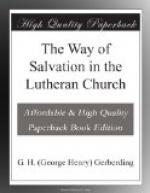True penitence always grows into faith, and true faith always presupposes penitence. Where one is, there the other is, and where both are, there is conversion. Penitence, therefore, is not something that goes before conversion, and faith something that follows after, and conversion an indefinable something sandwiched in between, as some seem to imagine; but penitence and faith are the constituent elements that make up conversion.
In the next place we would inquire: Who need this change? We answer, first, all who are not in a state of loving obedience to God; that is, all who are not turned away from and against sin and Satan, and turned toward holiness and God. On the other hand, all who really hate sin, mourn over it, strive against it, trust in and cling to Christ as their personal Redeemer, need no conversion. No matter whether they can tell where and when and how they were converted or not. All who know by blessed experience that they now have in their hearts the elements of penitence and faith, are in a state of conversion, and if they earnestly ask God, may have the assurance that their sins are forgiven and they are accepted in the Beloved. True, this assurance may sometimes be dimmed by doubt or under the strain of strong temptation, but as long as there is real hatred of sin and an earnest desire to rest in Christ alone, there is Grace and acceptance with Christ.
To the class of those who are in a converted state belong those baptized children of the Church who have kept their baptismal covenant. Given to Christ in holy baptism, the seeds of the new life implanted through that divine ordinance, reared and trained by Christian parents or guardians, they have belonged to Christ from their childhood. From their earliest years they have hated sin, repented of it, trusted in Christ, and loved Him. They are “turned from darkness to light and from the power of Satan to God.” They need only that daily dying to sin, and daily turning to Christ, which all Christians need on account of the sins and infirmities of the flesh which still cleave to them. Such were Joseph, and Samuel, and Daniel, and Jeremiah, and John the Baptist, and Timothy, and others of whom we read in the Scriptures. They were children of the covenant, and therefore children of God. Of this class we have written in former chapters. We need not enlarge on them here. They need no conversion, because they are in a converted state. Yet there are well-meaning people, who have more zeal than knowledge, who would violently exhort even such to be converted, or they cannot be saved! Thus would they confuse them, distract them, unsettle their faith in Christ, quench the Spirit, and, perhaps, drive them to unbelief and despair. From all such teachers, we pray: “Good Lord, deliver us.”
CHAPTER XIX.
CONVERSION—VARIED PHENOMENA OR EXPERIENCE.
We have spoken of the meaning of this term, inquired into the nature of the change, and noted its essential elements. We have also learned that there are some who do not need it because they are in a converted state, and that all who are not in such a state of Grace, do need conversion, regardless of anything that may or may not have taken place in the past.




